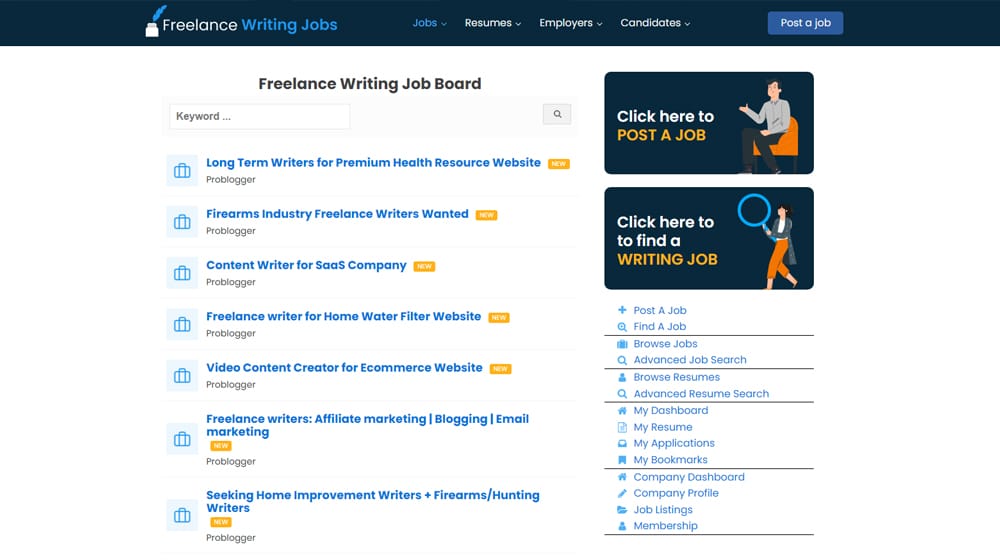AI content generators are sweeping the field of content creation, eliminating the need to hire writers for a lot of the low-level, boring, barely-unique content needs like product descriptions, short resource posts, and technical writing.
AI isn't perfect, though. To use it effectively, you need humans to oversee the content it creates, fact-check the output, smooth over the discontinuities, and stitch together generated sections of content. It's currently impossible to use AI content without editing unless you want your site to be flagged as nonsensical spam.
 The natural solution, of course, is to hire someone to smooth out the AI content and make it publishable on your site.
The natural solution, of course, is to hire someone to smooth out the AI content and make it publishable on your site.How do you go about hiring an AI editor? Let's dig in.
The first thing you need to know is what, exactly, an AI editor does. As it turns out, there are several possible roles that can fall under that banner.

I go over this in greater detail here, but here's a quick rundown:
Sometimes, one person can wear many hats and do several of these roles. Sometimes, you want several different people working together, along with human content writers and graphic designers, to form a complete team. Look at your current team, and figure out what duties need to be fulfilled when you add an AI to the mix.
You likely have your own content team already. Maybe this is just one or two freelancers you hire on a weekly basis to write content for you. Maybe it's a larger, more robust team you have constantly creating content for your blog while also handling other content like product descriptions, landing pages, ad copy, and social media posts.
When you slot an AI content generator into the mix, what are your needs? What purpose does the AI fulfill, and what support does it need to be functional and useful?

 I'll tell you one thing: you shouldn't jump on the bandwagon and fire all of your writers right away. The AI is almost certainly going to be a poor replacement, at least for long-form content and content with original thoughts and conclusions.
I'll tell you one thing: you shouldn't jump on the bandwagon and fire all of your writers right away. The AI is almost certainly going to be a poor replacement, at least for long-form content and content with original thoughts and conclusions.There's no one-size-fits-all answer here.
At a minimum, you'll need someone to review the content generated by the AI tools and guide where it fits in your overall content plan. Starting small – with things like product descriptions and ad copy – is a good idea. Trying to leap into long-form content, which AI already struggles with, can be expensive, time-consuming, and difficult.
The AI Editor you're hiring will have three general responsibilities.
This will require someone with a lot of attention to detail and a deep understanding of your brand, your subject, and the guidelines you follow for your content. AI can happily switch between POVs and perspectives, as well as levels of formality, and there's not really a good way to enforce guidelines short of manual editing.
This isn't necessarily all that different from hiring a standard group of content-writing freelancers. Freelancers need a brand guidelines and standards document, whether it's something as simple as "write in AP style using X, Y, and Z as guidelines" or a more complex and comprehensive style document. An editor needs to review the content you would publish to make sure it fits, regardless of how that content is created.

The difference here is that you can teach a freelancer, but you can't teach an AI. When a freelancer makes a mistake, you can point it out in the guidelines, ask for a revision, and keep reminding them until they internalize it. Over time, they'll get it. An AI doesn't have that learning capacity (at least, not unless you develop a unique AI based only on your content, but that won't be nearly as robust or useful)
What goes into a brand guidelines document?
There's plenty more that can go into a brand guidelines document. Usage guides for your logo, your chosen color scheme, typography and font choices, and so on. Most of these are more relevant to graphic designers, ad managers, and other brands using your imagery in their promotional content, though. Moreover, the AI-generated content isn't going to respect them or care about them.
Once you have everything ready, you can start to generate a job listing. Feel free to use the AI to do this if you're willing to go through every word it says and pick it over. A job posting is fairly standardized, after all.
Normally, with freelancers, you have the choice of posting a job listing on various job sites or going out and looking for freelancers to hire based on their profiles on sites like Upwork.
AI is too new to have many freelancers who are already established with working with AI. There are people with a few months of experience, generally at most, unless they're developers. Editors are a very new role (at least as of this writing), so there aren't many freelance profiles out there with it listed as a skill.
You can, of course, still try. Some people will have mentioned AI in their skill sets. It's up to you how much you trust their expertise this soon into a new technology, however.

For the time being, I recommend posting job a listing. You can also look into hiring traditional editors, though some editors will reject working with AI content, either for technical reasons or moral reasons. Be up-front that you're looking for someone to work with AI-generated content.
If you want to get started, my job board is a great place to post an opportunity.
While you're waiting for freelancers to apply to your job opening, you should go to your AI platform of choice, whether it's ChatGPT, Jasper, or something else. Use it to generate a handful of pieces of content of varying sorts, like a product description, a handful of social media posts, or a bit of ad copy. These will be your testing content.
When freelancers apply to be your editor, give them a test. Hand them your brand style guide document – or a pared-down version of it – and have them edit the content you just generated. It will almost certainly have a few mistakes that need correcting, but with content you personally generated, you should be familiar enough to recognize those issues and know how to fix them on your own. Then, you can compare what the freelance AI editors give you to what your ideal would be.

Note: I highly recommend paying for your trial project. The test pieces should generally be pretty short, so even at going rates for good editors, it won't be expensive to test out a handful of different editors to see how well they work for your needs. Paying for projects also shows that you're serious about hiring a freelancer, and it shows that you aren't trying to use AI just to exploit the cheapest possible labor available.
Once you get reviews from your various potential AI editors, you can evaluate them. Look at things like:
And, of course, you always have other elements, like culture fit, to consider. You'll need to pick an editor to hire, so choose the best one and offer them the role.
There will naturally be some negotiation here. You'll need to determine pay rates and how they charge (per word, per page, per project, etc.) and work something out with your candidate.

I also recommend getting a contract signed. Some freelancers will work without one, and some companies hire without needing one, but it's always a good idea to have some formal backing for the relationship you have going. A contract pins down terms, pay rates, deadlines, and more. Moreover, it's a crucial part of peace of mind for any freelancer, so offering a good contract will help you retain the best editors.
Once you have an editor nailed down, all you need to do is start the ball rolling on your project. Start generating AI content (or have your dedicated AI content writer handle it) and funnel it toward the editor. Edit it, publish it, and see how it performs.
There are many considerations to be made when using AI content. Does it adequately represent your brand? Does it save you time, money, or both? Does it perform adequately? AI is in a tricky place at the moment, with a lot of controversy surrounding it. You'll need to be agile and willing to make adjustments on the fly as standards, rules, and tools all change.
If you have a need for freelancers for any part of this, from high-quality content writing to AI tool usage to editing, I highly recommend both my hiring resources and my job board. I'm striving to put together the best resource and hiring site on the web for writers, editors, and companies who need them, but I can't do it without you.